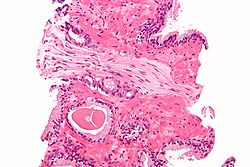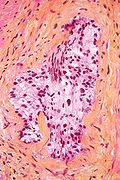Difference between revisions of "Perineural invasion"
Jump to navigation
Jump to search

| Line 1: | Line 1: | ||
[[Image:Prostatic adenocarcinoma with perineural invasion.JPG|thumb|right|250px|Perineural invasion in prostate carcinoma. [[H&E stain]].]] | |||
'''Perineural invasion''', also known as '''perineural tumour''', is the presence of a tumour within the nerve sheath. It is abbreviated as '''PNI'''. | '''Perineural invasion''', also known as '''perineural tumour''', is the presence of a tumour within the nerve sheath. It is abbreviated as '''PNI'''. | ||
Revision as of 05:00, 19 October 2014

Perineural invasion in prostate carcinoma. H&E stain.
Perineural invasion, also known as perineural tumour, is the presence of a tumour within the nerve sheath. It is abbreviated as PNI.
Generally, it is an indicator of a poor prognosis.
Specific tumours
| Tumour | Prognosis | Comment |
|---|---|---|
| Colorectal carcinoma | independent predictor[1] |
Microscopic
Features:
- Tumour within the nerve sheath.
DDx:
- Benign perineural glands (known as benign perineural involvement).[2]
- Should not completely wrap around the gland.
Images
See also
References
- ↑ Liebig, C.; Ayala, G.; Wilks, J.; Verstovsek, G.; Liu, H.; Agarwal, N.; Berger, DH.; Albo, D. (Nov 2009). "Perineural invasion is an independent predictor of outcome in colorectal cancer.". J Clin Oncol 27 (31): 5131-7. doi:10.1200/JCO.2009.22.4949. PMID 19738119.
- ↑ Ali, TZ.; Epstein, JI. (Sep 2005). "Perineural involvement by benign prostatic glands on needle biopsy.". Am J Surg Pathol 29 (9): 1159-63. PMID 16096404.

